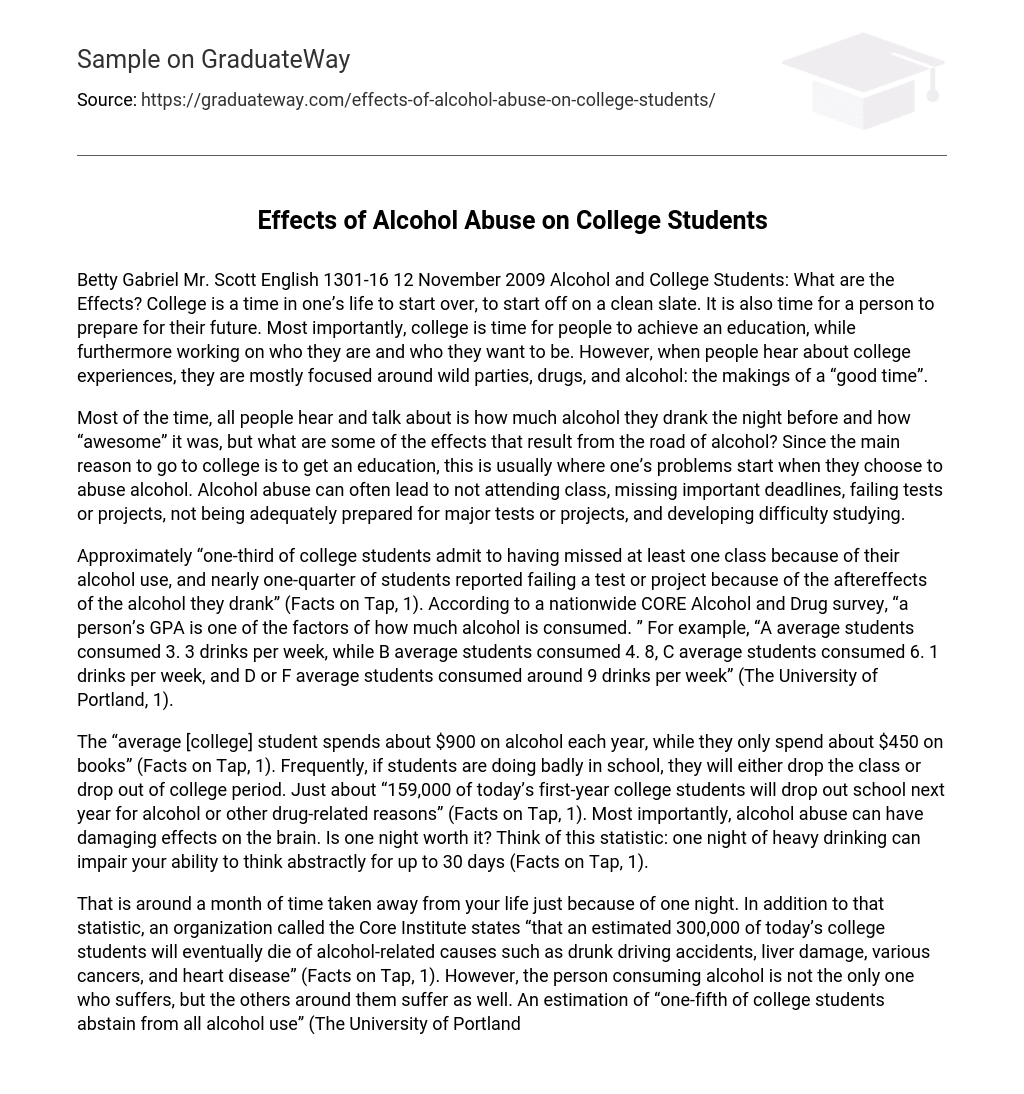College is a time of new beginnings, where individuals can start fresh and lay the groundwork for their future. It is also a period of acquiring knowledge and shaping one’s identity and aspirations. However, college experiences are often associated with lively parties, substance abuse, and alcohol consumption – elements that are commonly linked to enjoyable moments.
While it is common for individuals to primarily discuss their alcohol intake and enjoyable experiences, it is crucial to acknowledge the potential repercussions of excessive drinking. This can particularly affect college students’ academic progress. The consequences of alcohol abuse often include skipping classes, disregarding vital deadlines, performing poorly on exams or assignments, insufficient preparation for significant tests or projects, and difficulties in studying.
Approximately one-third of college students confess to skipping classes because they drink alcohol, as reported by Facts on Tap. Additionally, nearly 25% of students fail exams or assignments due to the negative effects associated with alcohol consumption. The nationwide CORE Alcohol and Drug survey reveals a connection between an individual’s GPA and their alcohol intake. For instance, individuals who maintain an A average typically consume an average of 3.3 drinks per week, while those with a B average consume approximately 4.8 drinks per week. Students with a C average tend to consume around 6.1 drinks per week, whereas those with a D or F average reportedly consume roughly 9 drinks per week according to The University of Portland.
According to Facts on Tap, the typical college student spends around $900 per year on alcohol and only $450 on books. If students are struggling academically, they often choose to drop out or withdraw from classes. Surprisingly, an estimated 159,000 first-year college students are projected to leave school the next year due to alcohol or substance abuse (Facts on Tap, 1). It is important to recognize that misuse of alcohol can have detrimental effects on the brain. Is it really worth it for just one night? Consider this fact: consuming excessive amounts of alcohol in a single evening can impair abstract thinking abilities for a duration of 30 days (Facts on Tap, 1).
The Core Institute states that alcohol consumption can reduce an individual’s lifespan by about one month. Furthermore, this organization reports that approximately 300,000 college students will eventually face alcohol-related deaths due to factors such as drunk driving accidents, liver damage, various cancers, and heart disease. It is noteworthy that the effects of drinking extend beyond the drinker themselves as those in their vicinity are also impacted. The University of Portland estimates that 20% of college students choose not to drink any alcoholic beverages.
According to the Harvard School of Public Health’s College Alcohol Study, more than 75% of students who live on campus reported experiencing various alcohol-related effects (Secondary Effects of Alcohol Abuse, 1). These effects include disruptions while studying or sleeping, assisting intoxicated peers, feeling offended, getting injured, damaging property, facing assault incidents, and encountering sexual assault or rape cases among college students (Alcohol and Drug Abuse on College Campuses, 2).
The impact of alcohol use and abuse in colleges extends to the surrounding community. It has adverse effects on the lives of individuals in the local communities, causing issues such as excessive noise, litter, and vandalism (Secondary Effects of Alcohol Abuse, 2). However, despite the predominantly negative consequences, there are also occasional positive outcomes.
Universities and colleges are implementing new policies and programs to decrease alcohol use and abuse. These measures include “enhancing academic requirements to create challenges for students who misuse alcohol, arranging classes on Fridays to prevent parties on ‘thirsty’ Thursdays, and extending the hours of libraries and recreational facilities to provide alternative activities for students instead of drinking and partying” (Alcohol Education Project 4, 5).
According to the Alcohol Education Project, various measures are being taken to tackle alcohol-related issues on campus. These include prohibiting alcohol companies from sponsoring athletic programs, imposing restrictions on alcohol advertising in campus publications and on campus grounds, keeping a check on fraternities, arranging diverse social and recreational activities that do not involve alcohol consumption, implementing strict disciplinary actions for repeat offenders, notifying parents when students repeatedly violate alcohol laws, and running media campaigns to educate students about the prevalence of drinking on campuses (Alcohol Education Project 5).
The Alcohol Education Project showcases various colleges and universities that have been acknowledged for their efforts in alcohol prevention, intervention, and education. Among these institutions are Boston College, Rutgers University, Syracuse University, Massachusetts Institute of Technology, Washington State University, and the University of Nebraska-Lincoln (iii, iv). Additionally, there are specific programs dedicated to addressing alcohol-related issues such as the BACCHUS Network (Boosting Alcohol Consciousness Concerning the Health of University Students), GAMMA group (Greeks Advocating Mature Management of Alcohol), and Facts on Tap (The BACCHUS Network, 1).
For nationwide effectiveness, a greater number of colleges and universities need to implement these programs. Alcohol abuse among college students yields detrimental effects on students, colleges, and communities. By embracing initiatives such as alcohol-free activities, campaigns, and educational programs, colleges and their students can combat the adverse impacts of alcohol abuse.





